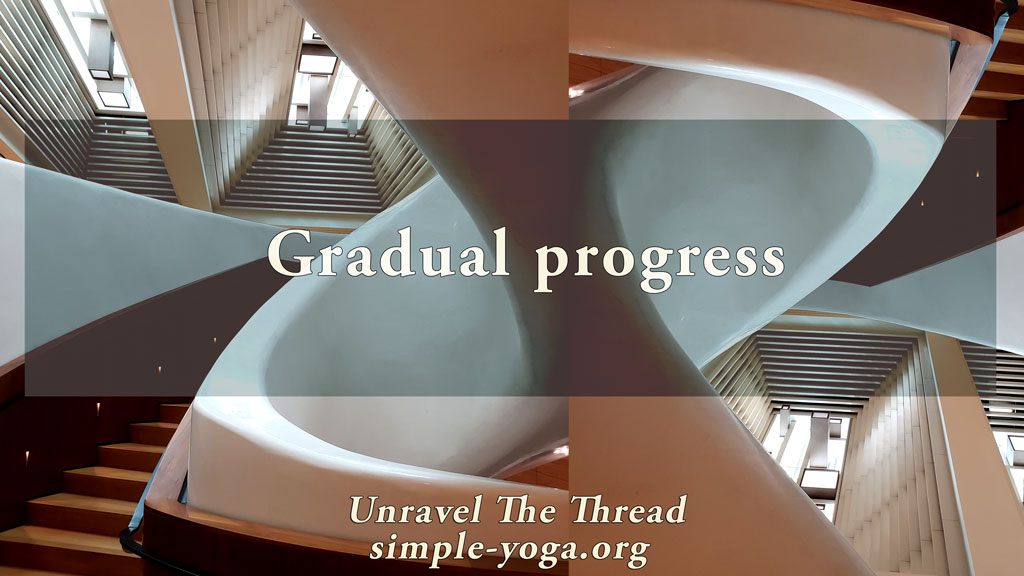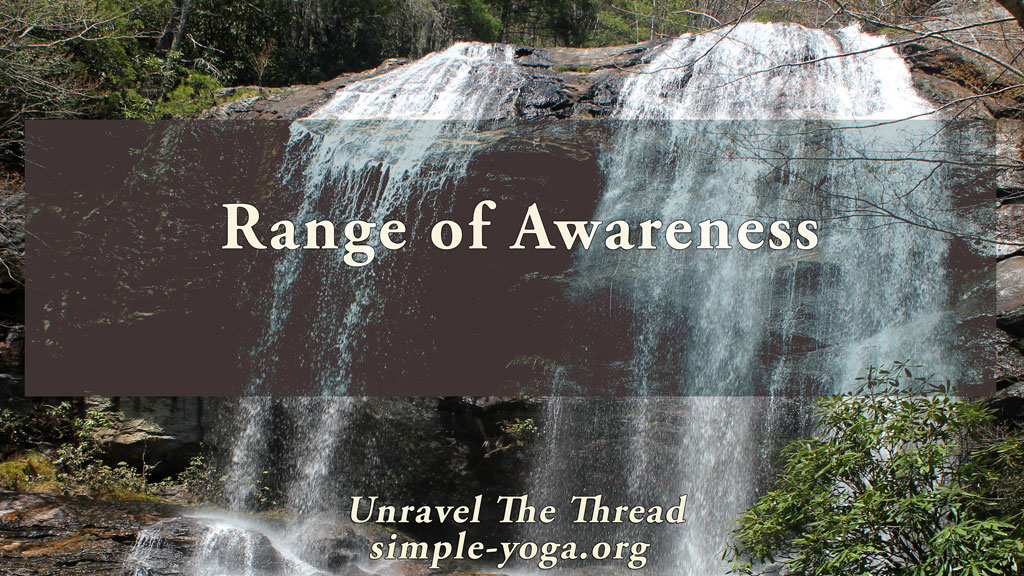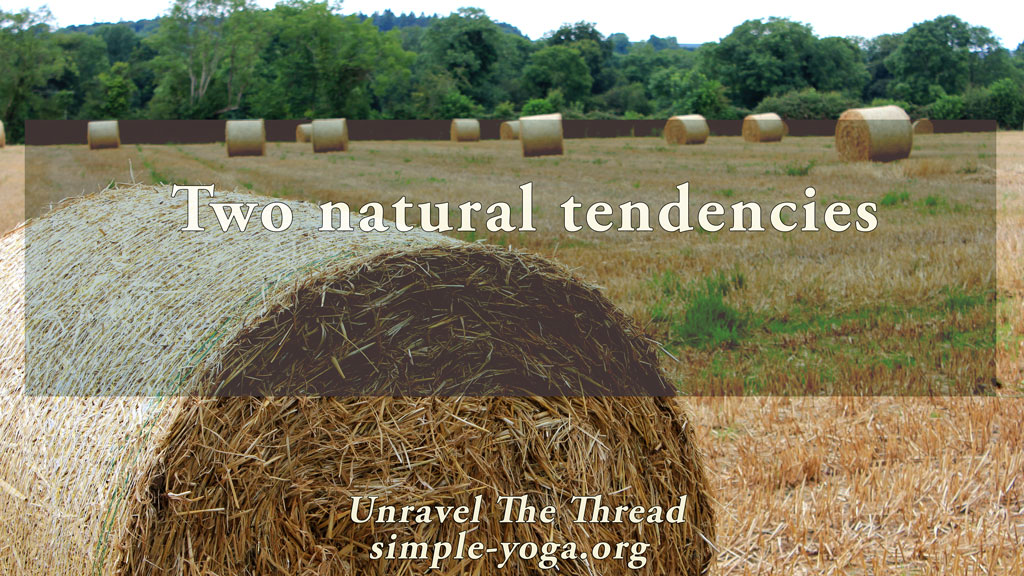
Gradual progress
December 12, 2023
Range of Motion, Action, Awareness
January 16, 2024
Gradual progress
December 12, 2023
Range of Motion, Action, Awareness
January 16, 2024Two natural tendencies

Two natural tendencies
As we try to connect with our unclouded awareness, it can be frustrating to realize that we have cultivated tendencies that take us away from being present. For example, we may find that we have become accustomed to the constant flow of interruptions from the many applications on our computers and phones. We may have become used to switching tasks frequently, so we may not have trained our minds to stay focused for long periods of time. Or we may discover tendencies in our inner dialogue that lead to negativity or self-judgment.
As we become aware of unhelpful tendencies, it is normal to feel discouraged or frustrated. As always, it is good to remember that important change is taking place. Some of our unconscious tendencies are coming into the light of consciousness. This is the first step toward meaningful change, for it is quite unlikely that we can change habits we don’t even know we have.
One of these unhelpful tendencies can be an excessive focus on the negative. For example, we receive feedback on our work, and even if the majority of the feedback is positive, our mind is likely to focus on the one negative review we received. Of course, it is important to learn what we need to improve, so we are not suggesting that we ignore negative feedback, especially if it is constructive. However, if we keep returning to the same negative feedback and using it to undermine our abilities and accomplishments, it may be useful to find ways to overcome this frustration and negativity. One simple way is to recognize two natural tendencies that most, if not all, of us have.
Feeling better
Our first useful natural tendency is the tendency you may be experiencing as you read or listen to this. Notice that you are probably making small adjustments to your posture. Even without thinking about it, each adjustment is trying to help you feel better, more comfortable, or more at ease. Every time you scratch an itch or take a sip of water, you are probably doing something that instinctively feels better. If you examine most, if not all, of your actions, you will find that they are motivated by this first natural tendency, the desire to feel better. Every time you eat something, you do it because you think or feel that it will make you feel better. Take a moment to think about this. Is it possible that most of the time everything you do is moving you toward feeling better? For example, when you read something, watch a movie, or listen to music, you are most likely making a choice based on what will make you feel better than you do at that moment. Would you agree that this is a beneficial natural tendency? It is natural because you do not have to make any effort for this tendency to manifest.
No Pain
The second beneficial natural tendency complements the first. Similar to the tendency to move toward what feels good, we experience a natural tendency to move away from pain. It often acts as a reflex, something that happens unconsciously. Take a moment to notice if this second tendency is expressing itself through you at this moment. Consider how this tendency may be present in all aspects of your life. Is it possible that these two tendencies are involved in many of the decisions we make, both consciously and unconsciously? Even though we notice that we have unhelpful tendencies, it can be important to recognize that we also have natural helpful tendencies as well. Would it be possible for us to remember that these tendencies are helping us all the time?
Over the next days be curious to notice if these tendencies are present in you. If they are, are you aware of the role that they play in your daily activities?
We can explore how these two natural tendencies manifest in our daily lives. For example, even though we know from personal experience that our daily practice of yoga postures and movements always makes us feel more vital and in a better mood, when it is cold outside, we may want to stay in bed a little longer instead of getting out of bed and onto our yoga mat. Does this create an internal struggle to find the pros and cons of each choice? Does part of us argue for staying in bed because it feels nice and warm, using reasons like we deserve it because we have been working a lot? Does another part of us argue for the benefits of getting up and starting our day with our yoga practice? It can be argued that both sides are trying to get us to feel good; the stay-in-bed side may be focused on immediate gratification, while the other side may be willing to postpone gratification. This example reminds us of the idea of discriminative awareness (viveka khyati), which is generally used at the level of distinguishing the difference between our awareness and its contents. Yoga is a gradual progression of increasing our sensitivity and ability to discriminate, so that we can use our discrimination to help us choose intelligently. Remember that regardless of our choice, we are choosing to live with its consequences.
This type of reasoning can also be applied to the second natural tendency, the tendency to avoid pain. Pain is useful feedback. It alerts us to impending danger. So it is important to honor signs of pain. However, as we explored earlier, when we talked about learning to learn, we can sometimes confuse tolerable discomfort with pain. Every learning experience requires us to transcend our current situation. This inevitably creates tolerable discomfort, but we can conveniently misinterpret the tolerable discomfort as if it were pain, thus exempting ourselves from going through the discomfort that will help us grow.
As you explore these ideas and bring your awareness into these natural tendencies, become familiar with how they feel, what happens when you move toward feeling better? What do you feel when you notice pain? Then combine your current yoga practice, modulating your own ways of being, with your increasing sensitivity and discernment. What happens?
Other useful questions: Is the tendency to move toward what feels good similar to the concept of kindness? Could it be that the tendency to move away from pain is similar to the concept of compassion? As you consider these questions, notice if this reflection might offer insights into what you consider to be your true nature.
If you prefer, you may listen to the podcast:
This is an excerpt from the book Unravel the thread: Applying the ancient wisdom of yoga to live a happy life
If you find Simple-Yoga.org and Unravel the thread useful, consider supporting my labor with a donation, you may also donate using PayPal or Venmo. Thank you!
